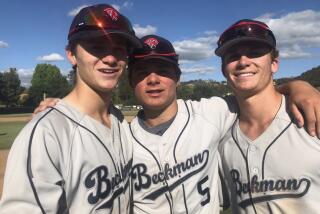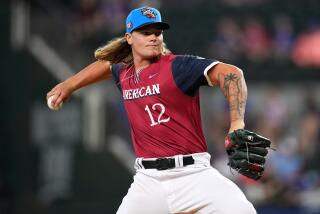Pitcher Dylan Covey is beating odds, not to mention foes
- Share via
On a cold, drizzly night, the baseball diamond at Jackie Robinson Stadium in Pasadena needs repairs if a game between Pasadena Maranatha and Brentwood is going to be played, and the person showing the best form handling a rake is one of the scheduled starting pitchers, Dylan Covey.
In a couple of months, Covey, 18, figures to have enough money to buy his own landscaping company, but the fact that he isn’t hiding in the warm, cozy Maranatha clubhouse in the middle of a steady rain validates what people have been saying about his impeccable character.
“He understands he needs to serve if he wants to be a leader,” Coach Brian DeHaan said. “He’s the first guy out to rake, to clean the shed, to maintain the field. He’s going to motivate guys by his actions. He doesn’t talk a lot, but based on what he does other people follow.”
Armed with a 94-mph fastball and a curveball that drops so sharply it seems as if it’s falling off a table as it approaches home plate, Covey, a 6-foot-2, 200-pound right-hander, has put himself in position to be a first-round choice next month in Major League Baseball’s annual amateur draft.
He has done so by beating the odds, rising up from a small school after coming forth — literally — when no one saw him coming.
His mother Angela says, “He’s our little miracle guy.”
She tells of how she and her husband, Darrell, decided to stop having children after Dylan’s older brothers, Brian, 37, and Nathan, 32, were born. She underwent a surgical procedure.
Years later, she changed her mind and went through an operation to reverse the procedure. A couple of years went by.
“Then, one December, I thought I had the flu and it turned out to be Dylan,” Angela said.
Said Dylan: “They tell me I was a miracle, but they also tell me I was the only one planned.”
He was home-schooled until it was time to go to high school, and since Nathan had gone to Maranatha, Dylan followed, though there was trepidation because he had become a promising baseball player.
“It was a hard decision,” Angela said. “We struggled with the fact we would be sending him to a small school, but it was right for him.”
Whatever doubts might have arisen from Covey’s playing against small-school competition in high school were erased over summers playing against the very best the club-team travel circuit had to offer. His name and talent became well known, from Florida to Arizona. On a team last year, he was throwing 95 mph and some scouts thought he was better than a couple of seniors who were considered top professional prospects.
And Maranatha’s baseball program got better, winning a Southern Section Division V championship last season behind Covey, who was 11-2 with 127 strikeouts. This season, he’s 5-0 with an 0.14 earned-run average. He has 104 strikeouts and only 15 walks in 51 2/3 innings, and has given up just 19 hits.
He was a flop as a freshman, with a 2-6 record, learning that no matter your reputation or potential, it comes down to throwing strikes, dealing with pressure and executing fundamentals.
At showcases, Covey says, scouts seem to be everywhere, with radar guns aimed en masse. Even at his high school games, 20 or more scouts show up, sit behind home plate and chart his every pitch, looking for any weakness, because someone is going to be investing lots of money in his right arm.
He accepted a scholarship from the University of San Diego last November, but it’s clear that professional baseball beckons. And since he’s gearing up to help his team make another title run, get ready for increased velocity and even sharper focus.
“I’ve been working toward the end of the season so I’ll be at full throttle when we get to the playoffs,” Covey said.
He’s pleased he can be an example of how you don’t have to attend a big school to get noticed.
“If you do well,” he said, “you’re name is going to be heard.”
twitter.com/LATSondheimer
More to Read
Go beyond the scoreboard
Get the latest on L.A.'s teams in the daily Sports Report newsletter.
You may occasionally receive promotional content from the Los Angeles Times.











